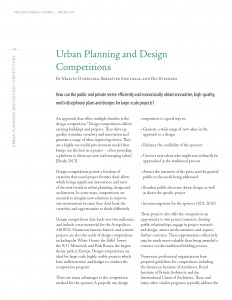Urban Planning and Design Competitions
How can the public and private sector efficiently and economically obtain innovative, high-quality, multi-disciplinary plans and designs for large-scale projects? An approach that offers multiple benefits is the design competition. “Design competitions deliver exciting buildings and projects. They drive up quality, stimulate creativity and innovation and generate a range of ideas improving choice. They are a highly successful procurement model that brings out the best in a project – often providing a platform to showcase new and emerging talent.” [Brady, 2013]
Design competitions permit a freedom of creativity that usual project formats don’t allow, which brings significant innovations and most of the new trends in urban planning, design and architecture. In some ways, competitions are essential to imagine new solutions to improve our environment because they don’t limit the creativity and opportunities to think differently. Design competitions date back over two millennia and include a war memorial for the Acropolis in 448 BCE. Numerous famous historic and current projects are also the result of design competitions including the White House; the Eiffel Tower; the 9/11 Memorial; and Park Russia, the largest theme park in Europe. Design competitions are ideal for large-scale, highly visible projects that have sufficient time and budget to conduct the competition program.
 There are many advantages to the competition method for the sponsor. A properly run design competition is a good way to:
There are many advantages to the competition method for the sponsor. A properly run design competition is a good way to:
- Generate a wide range of new ideas in the approach to a design
- Enhance the credibility of the sponsor
- Uncover new talent who might not ordinarily be approached in the traditional process
- Attract the attention of the press and the general public to the needs being addressed
- Broaden public discourse about design, as well as about the specific project
- Increase exposure for the sponsor (AIA, 2010)
These projects also offer the competitors an opportunity to win prizes/contracts, develop public relationships, engage in project research and design, attract media attention and acquire further contracts. These opportunities collectively may be much more valuable than being awarded a contract via the traditional bidding process.
Continue reading (…) DOWNLOAD #606_OPJ_Urban planning and design competitions_pag.14-16
The article ‘Urban Planning and Design Competitions’ by Martin Dubbeling, Sebastien Goethals, and Ric Stephens is published in the Oregon Planners’ Journal, Winter 2013, page 14-16.









